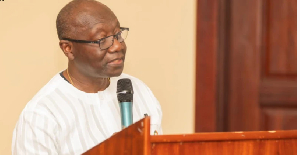Let me start by noting that was a great job by all who joined the “NO” campaign. I should be writing about the victory that saves this country and turn of events next week. I shall give you reasons to keep faith with the constitutional ideal by voting for women and persons with disability on December 17.
We should be reserving the 30% appointments to the Assemblies for women and persons with disabilities. By the way, the evidence is that women are a lot more efficient in managing these resources and are not or less corrupt.
This week is dedicated to anti-corruption awareness ahead of International Anti-Corruption Day on Monday, December 9.
This is part II of MY TAKE, and I am sure you didn’t know this easy way to catch corrupt public officers because the state has done practically nothing to bring this law to your attention.
An officer of one of a corruption-fighting state institution was lamenting that one of the reasons not much is achieved is because we don’t have laws against unexplained wealth acquisition. Another officer of another state anti-graft body, at the same occasion on Wednesday, was asking me to give some attention to articles 286 and 287 of the Constitution.
Article 286 is largely concerned with or requires public officers to declare their assets. It is refreshing to learn that the Attorney-General is working to ensure people don’t only list their assets, put in an envelope, seal and deliver to an Auditor-General who must not open it, but these will be verified and publicised.
Clause 4 then provides that “[a]ny property or assets acquired by a public officer after the initial declaration … and which is not reasonably attributable to income, gift, loan, inheritance or any other reasonable source shall be deemed to have been acquired in contravention of this Constitution”. Simply put, unexplained wealth by a public officer is corrupt conduct that is not condoned by law in Ghana.
In article 287, citizens are expected to lodge complaints of suspicious wealth acquisition by public officers before CHRAJ. The public officer may have to make an admission or prove the source of the acquisition in investigations by CHRAJ.
If an officer makes an admission or is found by the investigation to have corruptly acquired the property or asset, CHRAJ has the power, including as found in article 229, to take steps to confiscate such property or asset for the state before contemplating criminal prosecution, if it wishes.
$991.2 billion is the total of illicit financial outflows from developing countries in 2012 - according to Global Financial Integrity (2014). This is over 10 times the official development assistance received by these countries. Some $6.6 trillion left these countries illicitly between 2003-2012. These illicit flows increased by 9.4% each year in that period, faster than the growth of those economies. 2.7% of global GDP is "available" for laundering – according to UNODC.
This is how corruption compromises democracy and deeply gravely hurts the poor.
The United Nations Convention against Corruption defines corruption broadly to include grand and petty corruption, active and passive corruption, bribery, embezzlement, theft, fraud, extortion, abuse of function, favouritism and nepotism, cheating or exploiting conflicting interests and improper political contributions. It involves “the misuse of entrusted power for private gain”.
I have recommended the introduction of a new regime to shift the burden of proof of bribe to an accused who admits receipt of alleged bribe money but denies it is a bribe. This in the main means adopting the Civil Law approach instead of the Common Law approach of requiring the accuser to prove his/her allegations beyond reasonable doubt and without an expectation of the active involvement of a judge in proving the crime of the accused.
People must be made to explain their lifestyles, especially where there is evidence their income cannot sustain their lifestyles. This year’s Afrobarometer reveals a disturbing 61% of Ghanaians are afraid of so e form of retaliation if they blew the whistle on corrupt people. Please let’s be citizens and not spectators if we want roads, hospitals, schools that don’t get washed or blown away less than a year after they have been constructed at obviously overpriced rates. Just blow the whistle!
Samson Lardy ANYENINI
December 7, 2019
Opinions of Sunday, 8 December 2019
Columnist: Samson Lardy Anyenini















